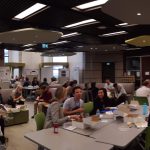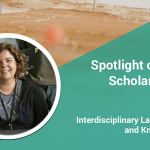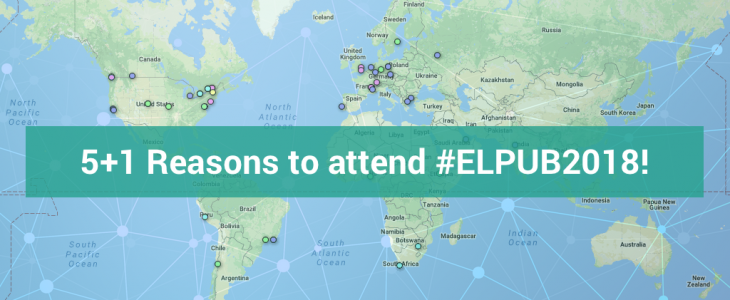
1. Learn about the latest innovations, research, policies and practices in scholarly publishing

The ELPUB Conference will be a great opportunity to learn about the latest innovations, research, policies and practices in scholarly publishing. The conference programme includes a variety of different sessions, including keynotes, session panels, poster presentations, demonstrations, and interactive workshops.
Presentations will cover a diversity of topics in scholarly publishing such as economics of open access publishing, alternative publishing models, shared governance of research infrastructures, as well as understanding infrastructures and policies for open science, open data, open educational resources and digital humanities.
Some presentations will review older and recent initiatives and projects – such as the Public Knowledge Project, DOAJ Ambassador Program, African Open Science Platform, Redalyc.org and Scholarly Hub – taking stock of progress thus far, challenges, and lessons learned. Other presentations will examine policies and models for collaboration, sustainability and interoperability, including projects like Coalition Publi.ca, PECE (Platform for Experimental, Collaborative Ethnography), and HIRMEOS (High Integration of Research Monographs in the European Open Science infrastructure). More details on the conference programme will be coming soon – so stay tuned!
(Photo by Marcos Luiz Photograph on Unsplash)
2. Gain a better perspective of the work going on in different regions of the world
Over the years, the ELPUB conference has attracted participation from a global community of researchers and scholars. This year, presenting authors will be coming from across North and South America, Asia, Africa, and Europe. Explore the diversity of presentations in the map above (or at this link) by clicking on the location pins. More information about the presentations will be coming soon.
Scholarly communication and education practices are situated in diverse geographical, cultural and social contexts. The ELPUB Conference will be a great opportunity to learn from scholars outside your specific discipline and network, and to learn of projects and initiatives taking place in different regions of the world. Meeting new people with different experiences and cultures is essential for us to question our own assumptions, to critique established norms, and to work together to make change.
3. Grow your network, meet new people, and form new partnerships
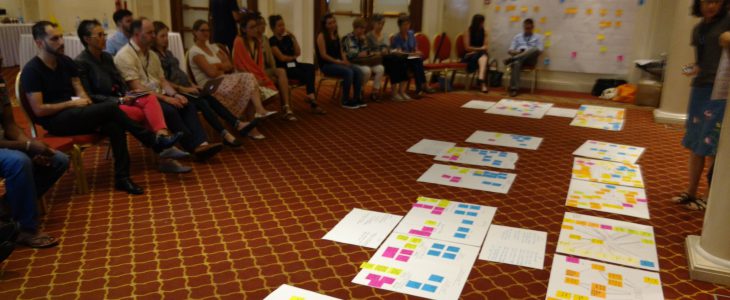
Relationships you build at ELPUB will sow the seeds of collaboration well after the conference. Attendees and presenters include a diverse international community of librarians, developers, publishers, funders, policy-makers, administrators and researchers across the disciplines in the sciences and the humanities. The conference will also provide opportunities for informal interaction and networking at the social events.
Use this as a chance to continue to build relationships with people in your field, or take this as an opportunity to meet new people who may work outside your discipline, or who live in another part of the world. You never know, you could be meeting someone who will become your next co-author, research collaborator, or colleague!
4. Participate in action towards community research infrastructure

Market-driven versions of open access are growing in prevalence, as well as a growing dependence on commercial publishers for the infrastructures needed to openly and democratically create and communicate knowledge.
This year’s conference theme challenges us to collaborate on the design and implementation of a sustainable community-driven research communication infrastructure that is also inclusive of diverse forms of knowledge making and sharing. If you want to contribute towards concrete actions, launch collaborations, or simply care about sustainability of open infrastructures, then you should participate!
(Photo by Ashes Sitoula on Unsplash)
5. Funders’ Roundtable will be a chance to engage on questions of sustainability and impact

The idea of a funders roundtable in the context of a scholarly communication conference is to begin to better align the needs of the scholarly community and the desire of funders to see results and real impact for their investment.
This roundtable will be an opportunity for funders to share experiences and their rationale for supporting open initiatives, their implementation strategies, successes so far, barriers and challenges encountered. It will also be a chance for dialogues between developers, researchers, community-oriented publishers and funders, who do not usually have a chance to fully understand each other’s needs and constraints.
More details on the Funders’ Roundtable will be coming soon – stay tuned!
(Photo by Chris Knight on Unsplash)
6. BONUS: Explore Toronto, an amazing diverse city with lots to see and do!

This year, the conference will be held in Toronto, Canada, one of the most diverse cities in the world, and a frequent host city to international audiences. Whether you’re interested in checking out the arts and culture scene, trying one of the many delicious restaurants, or exploring one of the many diverse neighbourhoods, there are plenty of reasons to discover Toronto.
Check out our interactive map to get to know Toronto, find accommodations (including conference rates for on-campus options), travel information (including discount from Air Canada), and suggested tourist activities.
(Photo credit: Tourism Toronto)
